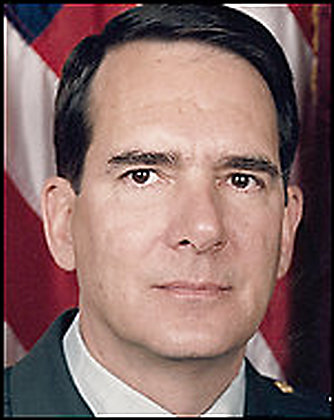By Yvonne Shinhoster Lamb
Courtesy of the Washington Post
Wednesday, October 3, 2007
Michael J. Scotti Jr., 68, a retired Army Major General who commanded all Army medical forces in Europe in the early 1990s and who oversaw the treatment and evacuation of soldiers during the Persian Gulf War, died of complications from leukemia September 12, 2007, at Walter Reed Army Medical Center. He lived in Arlington County.
In 1990, shortly before the start of the Gulf War, General Scotti became Chief Surgeon for the U.S. Army in Europe and commander of the 7th Medical Command in Germany. He took command of the Army’s large health-care system in Europe just after the Berlin Wall fell and efforts were underway to decrease the number of troops in Europe.
For the next four years, his task was enormous. He developed, coordinated and executed the evacuation and medical treatment plans for wounded Gulf War soldiers.
He had done much of the planning for the buildup of medical units to Kuwait while serving as brigadier general in the late 1980s, said retired Army surgeon and Lieutenant General Ronald Blanck. General Scotti planned for and then coordinated much of the movement of the wounded from the Middle East through Central Europe. He also coordinated with Navy and Air Force medical officials.
“Mike was one of those people who was forward thinking,” Blanck said. “He was a thinker, a strategist.”
He later outlined medical plans for the drawdown of forces in Europe after the breakup of the Soviet Union and oversaw Army medical forces during conflicts in the former Yugoslavia.
General Scotti, a physician who trained as an internist and in family practice, also is credited with helping to enhance primary-care medicine in the Army and focusing not just on individuals but on families as well. “He really promoted it,” Blanck said, and “he did a lot to create the infrastructure for it.”
Along the way, he also mentored a number of other doctors with careers in the Army. General Scotti always focused on the highest-quality medicine and medical education, said Major General Eric B. Schoomaker, Commanding General of the North Atlantic Regional Medical Command and Walter Reed Army Medical Center.
“He was one of our visionary leaders in Army medicine,” said Schoomaker, who worked under General Scotti in the 1990s. “He was one of the people who helped chart a path for us that kept us engaged.”
General Scotti served more than 30 years as an officer, including a year in Vietnam as a battalion surgeon in active combat during 1967 and 1968. For his frontline duties, he was awarded the Bronze Star Medal.
After retiring in 1996, he became vice president for medical education at the American Medical Association and later senior vice president for professional standards. While he was based in Chicago, his work focused on implementing AMA policies in medical education, ethics, research and clinical medicine.
General Scotti, a third-generation Italian American, grew up in Queens, New York, where he was the first member of his family to graduate from high school. He went on to receive a bachelor’s degree from Fordham University in 1960 and a medical degree cum laude from Georgetown University medical school in 1965.
He held a variety of clinical and administrative positions after completing a residency in internal medicine at Brooke Army Medical Center in San Antonio. He later received board certification in family medicine and advocated for the first family medicine training programs in the Army Medical Department. He served as chief of family medicine and director of the residency program at Eisenhower Army Medical Center in Fort Gordon, Georgia.
As the Soviet Union began to break into smaller, independent states, General Scotti organized a humanitarian aid program that included giving several of the former Soviet bloc states surplus Army medical equipment. He also organized medical missions to Central European nations.
In later years, Dr. Scotti held several volunteer positions, including clinical professor at the Uniformed Services University of the Health Sciences, president of the Society of Medical Consultants to the Armed Forces and as a member of the board of directors of the Army Distaff Foundation.
In 2005, he and several other retired military officers signed a letter to President Bush in support of legislation by Sen. John McCain (R.-Ariz.) to prohibit inhumane treatment of prisoners. He also advised McCain’s office on aspects of the Guantanamo Bay prison facilities.
General Scotti was a member and fellow of the American College of Physicians and the American Academy of Family Physicians and belonged to several other professional associations.
Besides the Bronze Star Medal, his Army decorations include the Distinguished Service Medal, the Legion of Merit, the Meritorious Service Medal and the Joint Service Commendation Medal.
Survivors include his wife of 45 years, Susan Faye Scotti of Arlington; three children, Michael Scotti of Naperville, Illinois, Pamela Camblin of Eugene, Ore., and Jennifer Scotti of Arlington; a sister; and eight grandchildren.
General Scotti was laid to rest with full military honors in Arlington National Cemetery on 3 December 2007.
- SCOTTI, MICHAEL JOHN JR
- MG US ARMY
- VIETNAM
- DATE OF BIRTH: 10/30/1938
- DATE OF DEATH: 09/12/2007
- BURIED AT: SECTION 3 SITE 1310-B
ARLINGTON NATIONAL CEMETERY
Michael Robert Patterson was born in Arlington and is the son of a former officer of the US Army. So it was no wonder that sooner or later his interests drew him to American history and especially to American military history. Many of his articles can be found on renowned portals like the New York Times, Washingtonpost or Wikipedia.
Reviewed by: Michael Howard

